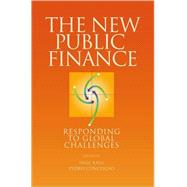- ISBN: 9780195179972 | 0195179978
- Cover: Paperback
- Copyright: 2/23/2006
The world's agenda of international cooperation has changed. The conventional concerns of foreign affairs, international trade, and development assistance, are increasingly sharing the political center stage with a new set of issues. These include trans-border concerns such as global financial stability and market efficiency, risk of global climate change, bio-diversity conservation, control of resurgent and new communicable diseases, food safety, cyber crime and e-commerce, control of drug trafficking, and international terrorism and weapons of mass destruction. Globalization and increasing porosity of national borders have been key driving forces that have led to growing interdependence and interlocking of the public domains--and therefore, public policy concerns--of countries, governments, private businesses, civil society, and people at large. Thus, new and different issues are now occupying top places on national policy agendas, and consequently, on the agendas of international negotiating forums. The policy approaches to global challenges are also changing. A proliferation and diversification of international cooperation efforts include focus on financing arrangements. Financing of international cooperation in most instances is a haphazard and non-transparent process and often seems to run parallel to international negotiations. There are many unfunded mandates and many-non-mandatory funds. To agree on and to achieve international economic goals, we need to understand how financing of international cooperation efforts actually works. Our understanding is hampered by two gaps: 1) lack of an integrated and cohesive theoretical framework; 2) lack of consolidated empirical and operational knowledge in the form of a comprehensive inventory of past, current and possible future (i.e. currently deliberated) financing mechanisms. This book reduces these two gaps and provides a guide to improve our ability to finance international cooperation.







